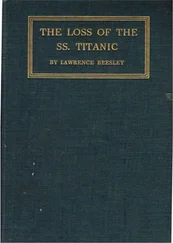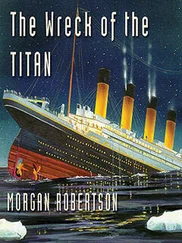Theodore Dreiser - The Titan
Здесь есть возможность читать онлайн «Theodore Dreiser - The Titan» весь текст электронной книги совершенно бесплатно (целиком полную версию без сокращений). В некоторых случаях можно слушать аудио, скачать через торрент в формате fb2 и присутствует краткое содержание. Жанр: Классическая проза, на английском языке. Описание произведения, (предисловие) а так же отзывы посетителей доступны на портале библиотеки ЛибКат.
- Название:The Titan
- Автор:
- Жанр:
- Год:неизвестен
- ISBN:нет данных
- Рейтинг книги:5 / 5. Голосов: 1
-
Избранное:Добавить в избранное
- Отзывы:
-
Ваша оценка:
- 100
- 1
- 2
- 3
- 4
- 5
The Titan: краткое содержание, описание и аннотация
Предлагаем к чтению аннотацию, описание, краткое содержание или предисловие (зависит от того, что написал сам автор книги «The Titan»). Если вы не нашли необходимую информацию о книге — напишите в комментариях, мы постараемся отыскать её.
The Titan — читать онлайн бесплатно полную книгу (весь текст) целиком
Ниже представлен текст книги, разбитый по страницам. Система сохранения места последней прочитанной страницы, позволяет с удобством читать онлайн бесплатно книгу «The Titan», без необходимости каждый раз заново искать на чём Вы остановились. Поставьте закладку, и сможете в любой момент перейти на страницу, на которой закончили чтение.
Интервал:
Закладка:
“Say, what do you think of these delegations, Senator?” inquired a certain Representative Greenough of Senator George Christian, of Grundy, one morning, the while a group of Chicago clergymen accompanied by the mayor and several distinguished private citizens passed through the rotunda on their way to the committee on railroads, where the house bill was privily being discussed. “Don’t you think they speak well for our civic pride and moral upbringing?” He raised his eyes and crossed his fingers over his waistcoat in the most sanctimonious and reverential attitude.
“Yes, dear Pastor,” replied the irreverent Christian, without the shadow of a smile. He was a little sallow, wiry man with eyes like a ferret, a small mustache and goatee ornamenting his face. “But do not forget that the Lord has called us also to this work.”
“Even so,” acquiesced Greenough. “We must not weary in well doing. The harvest is truly plenteous and the laborers are few.”
“Tut, tut, Pastor. Don’t overdo it. You might make me larf,” replied Christian; and the twain parted with knowing and yet weary smiles.
Yet how little did the accommodating attitude of these gentlemen avail in silencing the newspapers. The damnable newspapers! They were here, there, and everywhere reporting each least fragment of rumor, conversation, or imaginary programme. Never did the citizens of Chicago receive so keen a drilling in statecraft—its subtleties and ramifications. The president of the senate and the speaker of the house were singled out and warned separately as to their duty. A page a day devoted to legislative proceeding in this quarter was practically the custom of the situation. Cowperwood was here personally on the scene, brazen, defiant, logical, the courage of his convictions in his eyes, the power of his magnetism fairly enslaving men. Throwing off the mask of disinterestedness—if any might be said to have covered him—he now frankly came out in the open and, journeying to Springfield, took quarters at the principal hotel. Like a general in time of battle, he marshaled his forces about him. In the warm, moonlit atmosphere of June nights when the streets of Springfield were quiet, the great plain of Illinois bathed for hundreds of miles from north to south in a sweet effulgence and the rurals slumbering in their simple homes, he sat conferring with his lawyers and legislative agents.
Pity in such a crisis the poor country-jake legislator torn between his desire for a justifiable and expedient gain and his fear lest he should be assailed as a betrayer of the people’s interests. To some of these small-town legislators, who had never seen as much as two thousand dollars in cash in all their days, the problem was soul-racking. Men gathered in private rooms and hotel parlors to discuss it. They stood in their rooms at night and thought about it alone. The sight of big business compelling its desires the while the people went begging was destructive. Many a romantic, illusioned, idealistic young country editor, lawyer, or statesman was here made over into a minor cynic or bribe-taker. Men were robbed of every vestige of faith or even of charity; they came to feel, perforce, that there was nothing outside the capacity for taking and keeping. The surface might appear commonplace—ordinary men of the state of Illinois going here and there—simple farmers and small-town senators and representatives conferring and meditating and wondering what they could do—yet a jungle-like complexity was present, a dark, rank growth of horrific but avid life—life at the full, life knife in hand, life blazing with courage and dripping at the jaws with hunger.
However, because of the terrific uproar the more cautious legislators were by degrees becoming fearful. Friends in their home towns, at the instigation of the papers, were beginning to write them. Political enemies were taking heart. It meant too much of a sacrifice on the part of everybody. In spite of the fact that the bait was apparently within easy reach, many became evasive and disturbed. When a certain Representative Sparks, cocked and primed, with the bill in his pocket, arose upon the floor of the house, asking leave to have it spread upon the minutes, there was an instant explosion. The privilege of the floor was requested by a hundred. Another representative, Disback, being in charge of the opposition to Cowperwood, had made a count of noses and was satisfied in spite of all subtlety on the part of the enemy that he had at least one hundred and two votes, the necessary two-thirds wherewith to crush any measure which might originate on the floor. Nevertheless, his followers, because of caution, voted it to a second and a third reading. All sorts of amendments were made—one for a three-cent fare during the rush-hours, another for a 20 per cent. tax on gross receipts. In amended form the measure was sent to the senate, where the changes were stricken out and the bill once more returned to the house. Here, to Cowperwood’s chagrin, signs were made manifest that it could not be passed. “It can’t be done, Frank,” said Judge Dickensheets. “It’s too grilling a game. Their home papers are after them. They can’t live.”
Consequently a second measure was devised—more soothing and lulling to the newspapers, but far less satisfactory to Cowperwood. It conferred upon the Chicago City Council, by a trick of revising the old Horse and Dummy Act of 1865, the right to grant a franchise for fifty instead of for twenty years. This meant that Cowperwood would have to return to Chicago and fight out his battle there. It was a severe blow, yet better than nothing. Providing that he could win one more franchise battle within the walls of the city council in Chicago, it would give him all that he desired. But could he? Had he not come here to the legislature especially to evade such a risk? His motives were enduring such a blistering exposure. Yet perhaps, after all, if the price were large enough the Chicago councilmen would have more real courage than these country legislators—would dare more. They would have to.
So, after Heaven knows what desperate whisperings, conferences, arguments, and heartening of members, there was originated a second measure which—after the defeat of the first bill, 104 to 49—was introduced, by way of a very complicated path, through the judiciary committee. It was passed; and Governor Archer, after heavy hours of contemplation and self-examination, signed it. A little man mentally, he failed to estimate an aroused popular fury at its true import to him. At his elbow was Cowperwood in the clear light of day, snapping his fingers in the face of his enemies, showing by the hard, cheerful glint in his eye that he was still master of the situation, giving all assurance that he would yet live to whip the Chicago papers into submission. Besides, in the event of the passage of the bill, Cowperwood had promised to make Archer independently rich—a cash reward of five hundred thousand dollars.
Chapter LIX.
Capital and Public Rights
Between the passage on June 5, 1897, of the Mears bill—so christened after the doughty representative who had received a small fortune for introducing it—and its presentation to the Chicago City Council in December of the same year, what broodings, plottings, politickings, and editorializings on the part of all and sundry! In spite of the intense feeling of opposition to Cowperwood there was at the same time in local public life one stratum of commercial and phlegmatic substance that could not view him in an altogether unfavorable light. They were in business themselves. His lines passed their doors and served them. They could not see wherein his street-railway service differed so much from that which others might give. Here was the type of materialist who in Cowperwood’s defiance saw a justification of his own material point of view and was not afraid to say so. But as against these there were the preachers—poor wind-blown sticks of unreason who saw only what the current palaver seemed to indicate. Again there were the anarchists, socialists, single-taxers, and public-ownership advocates. There were the very poor who saw in Cowperwood’s wealth and in the fabulous stories of his New York home and of his art-collection a heartless exploitation of their needs. At this time the feeling was spreading broadcast in America that great political and economic changes were at hand—that the tyranny of iron masters at the top was to give way to a richer, freer, happier life for the rank and file. A national eight-hour-day law was being advocated, and the public ownership of public franchises. And here now was a great street-railway corporation, serving a population of a million and a half, occupying streets which the people themselves created by their presence, taking toll from all these humble citizens to the amount of sixteen or eighteen millions of dollars in the year and giving in return, so the papers said, poor service, shabby cars, no seats at rush-hours, no universal transfers (as a matter of fact, there were in operation three hundred and sixty-two separate transfer points) and no adequate tax on the immense sums earned. The workingman who read this by gas or lamp light in the kitchen or parlor of his shabby flat or cottage, and who read also in other sections of his paper of the free, reckless, glorious lives of the rich, felt himself to be defrauded of a portion of his rightful inheritance. It was all a question of compelling Frank A. Cowperwood to do his duty by Chicago. He must not again be allowed to bribe the aldermen; he must not be allowed to have a fifty-year franchise, the privilege of granting which he had already bought from the state legislature by the degradation of honest men. He must be made to succumb, to yield to the forces of law and order. It was claimed—and with a justice of which those who made the charge were by no means fully aware—that the Mears bill had been put through the house and senate by the use of cold cash, proffered even to the governor himself. No legal proof of this was obtainable, but Cowperwood was assumed to be a briber on a giant scale. By the newspaper cartoons he was represented as a pirate commander ordering his men to scuttle another vessel—the ship of Public Rights. He was pictured as a thief, a black mask over his eyes, and as a seducer, throttling Chicago, the fair maiden, while he stole her purse. The fame of this battle was by now becoming world-wide. In Montreal, in Cape Town, in Buenos Ayres and Melbourne, in London and Paris, men were reading of this singular struggle. At last, and truly, he was a national and international figure. His original dream, however, modified by circumstances, had literally been fulfilled.
Читать дальшеИнтервал:
Закладка:
Похожие книги на «The Titan»
Представляем Вашему вниманию похожие книги на «The Titan» списком для выбора. Мы отобрали схожую по названию и смыслу литературу в надежде предоставить читателям больше вариантов отыскать новые, интересные, ещё непрочитанные произведения.
Обсуждение, отзывы о книге «The Titan» и просто собственные мнения читателей. Оставьте ваши комментарии, напишите, что Вы думаете о произведении, его смысле или главных героях. Укажите что конкретно понравилось, а что нет, и почему Вы так считаете.










